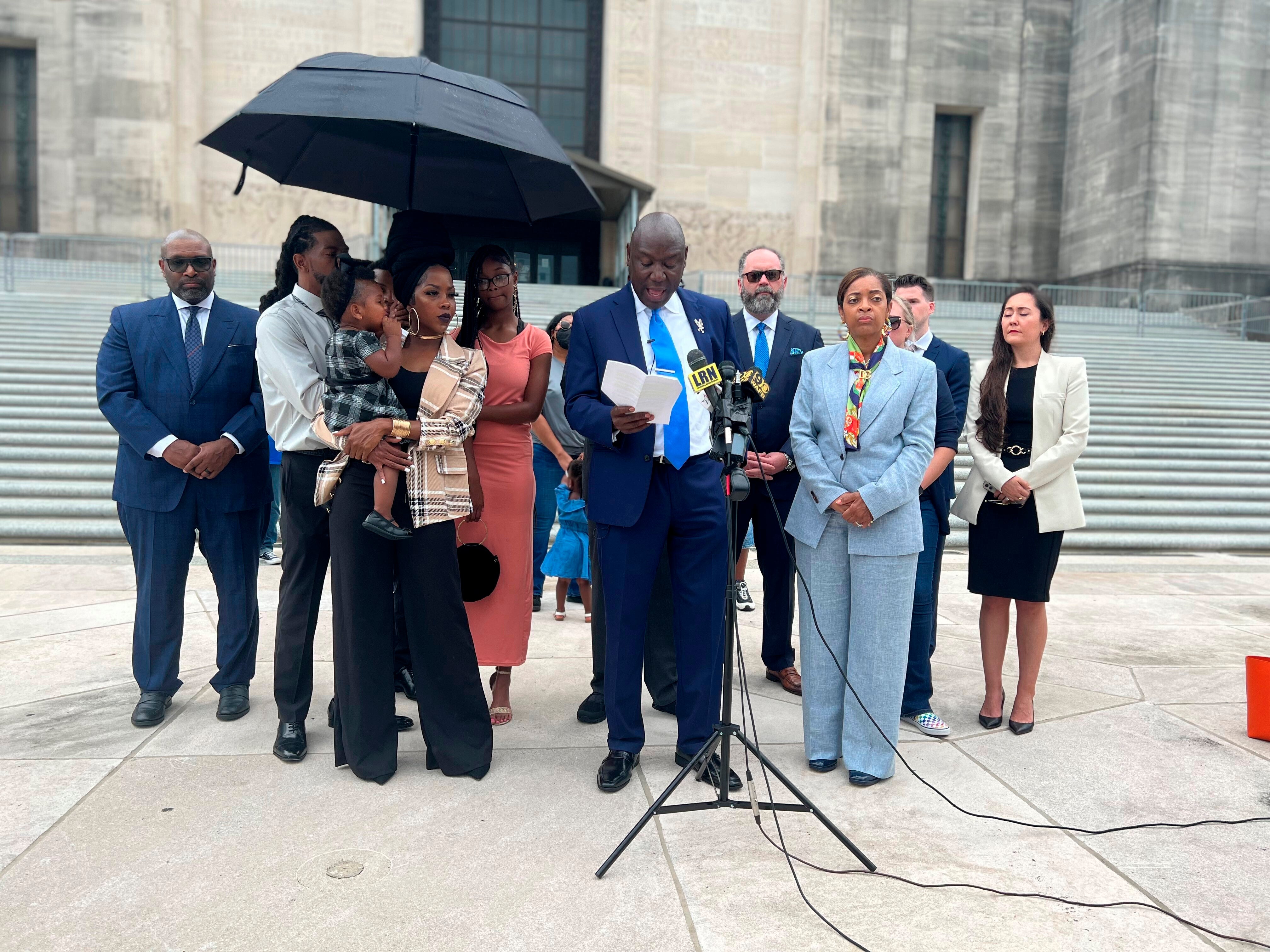She was forced to travel 1,400 miles to abort a skull-less fetus. Now she has a message for lawmakers
Exclusive: Nancy Davis speaks to Rachel Sharp about her traumatic ordeal and her fears that women’s lives are at risk because of abortion bans


Your support helps us to tell the story
From reproductive rights to climate change to Big Tech, The Independent is on the ground when the story is developing. Whether it's investigating the financials of Elon Musk's pro-Trump PAC or producing our latest documentary, 'The A Word', which shines a light on the American women fighting for reproductive rights, we know how important it is to parse out the facts from the messaging.
At such a critical moment in US history, we need reporters on the ground. Your donation allows us to keep sending journalists to speak to both sides of the story.
The Independent is trusted by Americans across the entire political spectrum. And unlike many other quality news outlets, we choose not to lock Americans out of our reporting and analysis with paywalls. We believe quality journalism should be available to everyone, paid for by those who can afford it.
Your support makes all the difference.A mother-of-three who found herself at the centre of America’s attack on abortion rights has spoken out against the lawmakers who are ignoring the toll on women, as she warned that many more lives are going to be put at risk.
Nancy Davis found herself forced to travel 1,400 miles to New York earlier this month to have an abortion for a fetus with no skull and no chance of survival, after she was denied the procedure in her home state of Louisiana.
She spoke out to The Independent on September 15 to share her ordeal and voice her frustration that the people introducing abortion bans are ignorant about what they are doing to women like her.
“I really don’t think they’ve thought it all the way through and how it can affect us women,” she said.
She added: “I want to bring consciousness and awareness to my situation and hopefully maybe it will help someone else in a similar situation.”
For Ms Davis and her partner Shedric, it was very much a planned pregnancy.
The couple have three other children together and dreamed of welcoming a fourth into the family.
“I found out at about seven or eight weeks and we were super excited and elated that we were having our fourth child,” she said.
“We were looking forward to it and planning things.”
But that excitement soon turned to “devastation” when she went for her 10-week scan.
It was then that doctors learned that the fetus had acrania – a rare and fatal condition where the skull does not form inside the womb, ultimately leading to the brain being destroyed.
If such a pregnancy is carried to term, the baby would die within a week of being born, according to the Fetal Medicine Foundation.
“There had been no indication anything was wrong,” said Ms Davis, revealing that she was “completely heartbroken” by the news.
“It was very traumatising and devastating and it caused a lot of mental anguish. I was completely heartbroken,” she said.

What she didn’t know at that stage was that the trauma would continue as she was denied an abortion in her home state and forced to carry the non-viable fetus for six additional weeks.
Following the US Supreme Court’s landmark ruling to strike down Roe v Wade back in June, dozens of Republican states have backpedaled on reproductive rights.
In the state of Louisiana, abortion is now banned – with no exception for rape or incest.
While the law has some exceptions for fatal medical conditions, acrania is not explicitly mentioned on the list created by the state’s GOP lawmakers.
Ms Davis said that the doctors at the hospital told her she would need to terminate the pregnancy and referred her to the Delta Clinic – an abortion clinic in Baton Rouge.
But when she contacted the clinic, she was told that they couldn’t help her because of the state’s abortion ban.
“When we asked about getting the termination done they said they were not able to do it because of the overturning of Roe v Wade and the Louisiana law. So they denied us and told us we would have to go out of state to have the procedure,” said Ms Davis.
She was told very little about the intricacies of the law but was aware that there was confusion around what healthcare professionals could legally do.
“The doctors were scared to perform the procedure because of the possibility of getting prosecuted or fined,” she said.
The Delta Clinic has since shuttered entirely. A statement on its website reads: “Following the Supreme Court decision in Dobbs and the enforcement of the Louisiana abortion bans, abortion is no longer legal in Louisiana except in rare cases. Due to these circumstances, Delta Clinic is closed.”
The clinic plans to relocate and is making arrangements to continue providing abortion care in two other states, it states.
For Ms Davis, this left her with two choices: carry the pregnancy for nine months and watch her baby die within its first week of life or travel to another state where abortion remains legal.

The former was an unbearable thought.
“The one thing I could think of was that continuing carrying this baby even after finding out that its condition was fatal meant I was carrying my baby to bury my baby,” she said.
“That was the only thing playing in my head all day every day.”
After sharing her story, more than $40,000 in donations was raised through a GoFundMe campaign to help her with travel and other expenses to get the procedure in another state.
On 1 September, she finally underwent the procedure at a Planned Parenthood clinic in Manhattan, New York – where abortion is still a protected legal right.
By that time, Ms Davis was 16 weeks and three days pregnant. It was also 1,400 miles from home.
Being forced to carry a fetus for another six weeks knowing that it had no chance of survival has taken its toll on the mother-of-three.
“It’s definitely been an emotional rollercoaster – literally in all aspects,” she said.
“Physically draining, mentally draining, emotionally draining… I’m extremely hurt by it, extremely hurt.
“I was just confused and it’s just unfair.”
Since speaking out she has received a lot of positivity from people – and a lot of messages from people surprised to learn that she was denied the much-needed care.
“I guess it’s always a shock with people not thinking it would happen until they see somebody else in that situation,” she said.
But she has also faced some negative emails and social media comments from the so-called pro-lifers.
For Ms Davis, she said she accepts other people’s opinions but knows she and her partner “made the best decision for our baby as well as for ourselves”.
State senator Katrina Jackson, who authored Louisiana’s abortion ban, has since claimed that Ms Davis’s pregnancy would have fallen under an exception to the law and that doctors should have given her an abortion.
But, Ms Davis is just the latest in a growing number of women who are being forced to carry unviable and sometimes dangerous pregnancies, as medical professionals try to navigate the confusion of the post-Roe world and seek to avoid jail time for violating sudden bans and unclear laws.
Ms Davis said that she fears what will happen to the women unable to navigate abortion bans by travelling to other states.
“Eventually [women] won’t end up getting proper care. It will put other women’s lives at risk,” she said.
“I definitely think more women will be affected and it will cause more health problems in women.”
Two weeks on from having the abortion, Ms Davis said she is now just trying to take things “day by day”.
“I’m doing okay. I’m taking it day by day and seeking therapy. And I have a loving family who have been a great support system and so I’m continuing to lean on them as well,” she said.
The whole traumatic experience has, however, left her questioning whether she and her partner will continue with their dreams of growing their family.
“It sure doesn’t make the experience any better by going through this,” she said.
“Who knows what will happen. I’m not saying a definite no. I’m no sure what will happen in the future.”
This article was originally published on 15 September


Join our commenting forum
Join thought-provoking conversations, follow other Independent readers and see their replies
0Comments